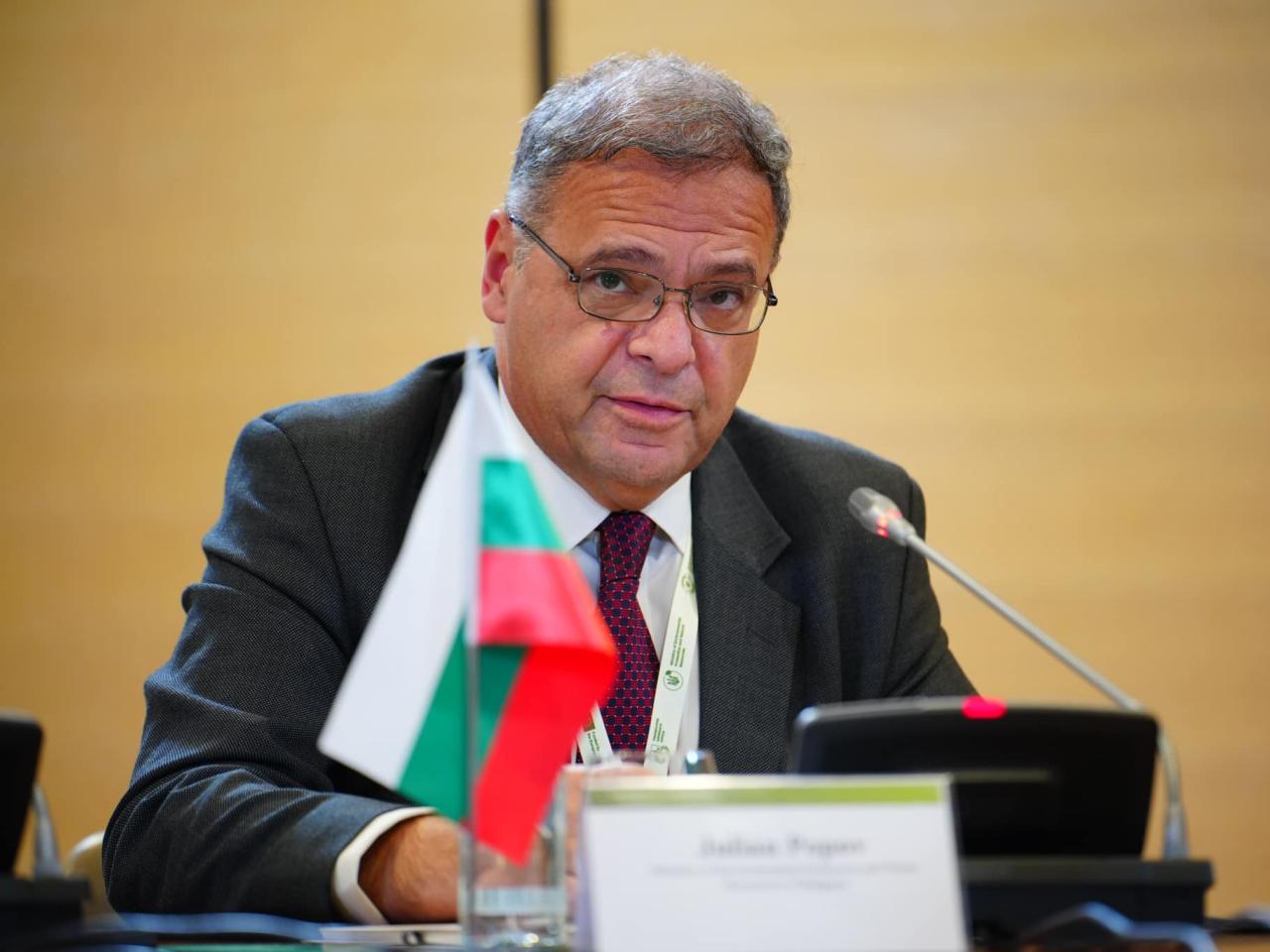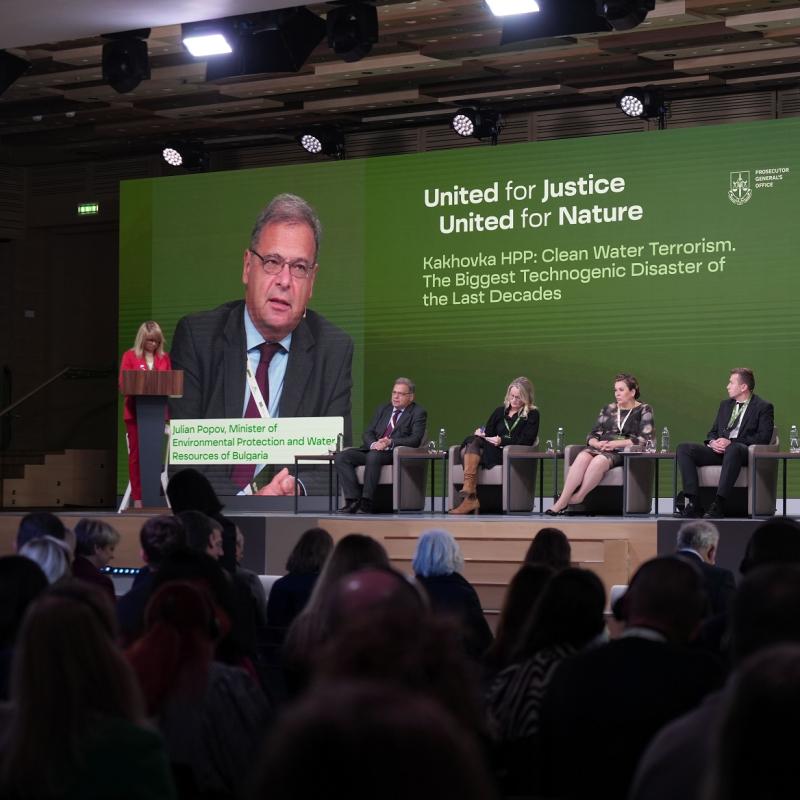Popov spoke to BlueLink’s Pavel Antonov just after returning from the international conference ’United for Justice. United for Nature’, which took place on October 20-21 in the Ukrainian capital, Kyiv. The main focus of the meeting was the post-war environmental restoration process in Ukraine and the Black Sea region, in which, according to Popov, Bulgaria will play a key role.
Julian Popov (1959) is minister for the Environment and Waters in the government of Bulgaria. Before that, he worked as an expert and advisor on climate policies and climate-related developments in Europe. He has twice been ranked as one of the 40 most influential voices in European energy policy. He is the author of two books, including a novel, and co-author of the books The European Supergrid and Energy and Climate Diplomacy.
Should we pursue ‘degrowth’ to keep a liveable planet?
“In my view, there are two ways to interpret the term. The first one is a very direct and intuitive one: that economic growth should stop and start reversing. That refers to material reduction of production and consumption, to living within boundaries that are defined as sufficient for human and societal needs. The other one – which I subscribe to – is that we have to change the definition of economic growth to include the externalities of economic activities. On that basis, we should start recalculating economic product, or GDP. This will give us a different picture of growth. We can then discuss whether we need degrowth or a different type of growth. The latter is feasible if the growth index includes factors such as environmental services, education and economic activities that are not harmful to the environment.”

One of the most popular visions of degrowth ever since 1972, when the Club of Rome defined its vision of limits to growth, is that the traditional urge for growth at all costs brings about economic and environmental consequences which lead to conflicts and tensions and undermine the security of the whole world. It seems that we are now very close to the predictions of the Club of Rome. As an expert, but also in your capacity as a decision-maker at the moment, do you see a tension between the short and the long term, between doing the right thing in response to the war in Ukraine and avoiding a downward spiral where environmental degradation and conflict fuel each other?
“When there is a war, the objective usually is very clear: to win the war. And we do accept the fact that the war puts very serious pressure on resources and the environment. At the conference in Kiev, we discussed exactly this issue: the environmental cost of the war, how it has to be repaid and how we should define environmental crimes as a result of a war, or, if I can coin a phrase, ’environmental war crimes’.
This is a very interesting topic. During a war or some other crisis, we might have pressing issues to address – we have to defend our lands, our rights. But what is also very important in such cases, and what I think Ukraine is doing incredibly well, is calculating the cost from the damage, because this damage has to be repaid.
The damage inflicted by the conflict has to be restored, nature has to be restored and that will cost a lot of money. It has big financial and environmental implications. In my view, it is very important to have a clear accounting of all these impacts so that we can take informed measures to compensate for the damage. The compensation can come through reparations by the invader, Russia in this case, or it could be enacted by the victimised country, which Ukraine is doing – it is repairing part of the damage.
It also can be the responsibility of the international community and this is also happening, at least to some small extent while the war is lasting. In the future, we should probably think of a way of reversing this damage – kind of repaying the ‘loan’ taken from nature.
Calculating the financial cost gives you a measurement, and this is very important for the issue of degrowth because we're starting to measure not just the product that is produced but also the damage that is inflicted. This is a growing field of economics, it's very much related to assessing loss and damage as a result of climate change, for instance, but also as a result of conflicts. That can redefine the whole practice of war reparations – they can be costed rather than just negotiated or imposed. It makes things much more measurable.”
Do you think the costs of the current war will ever be repaid?
“It's a very interesting legal question. Obviously, one way is to require payments for damage as part of a peace settlement when the war is over. Of course, nobody is very optimistic that Russia will say, ‘We inflicted damage and now we'll pay for it’. There are at least two other sets of instruments that can be used: imposing and maintaining continuous trade and economic sanctions, or freezing and using overseas assets, from frozen bank accounts, for example.”

Wouldn't this be a repeat of the mistakes made in the past after devastating military conflicts? In fact, World War II set а very interesting precedent in terms of the recovery of the defeated nation, which was Germany at the time. This worked rather well because Germany was demilitarised but received a lot of aid that helped it reconstruct as a nation and steer away from revanchism and further military expansion. Russia is a much bigger and much more difficult case. Could a post-war scenario with Russia implement the lessons learned from the period after World War II – which led to the creation of the EU, actually?
“Yes, of course. It would be a very difficult process. I can't imagine that the war will be over and somebody will hand a bill to the Russian government and they will agree to pay it, or if they do not agree, that international restrictions on Russian trade will cover the bill. The process will be much more complicated than that: there will be legal cases, cases for war crimes, there will be various other negotiations, reparations, conditionalities – all the instruments that have been developed after World War II but also in recent years in response to other conflicts.
The development of environmental law will also be very important, the further development of international treaties defining war crimes, crimes against humanity. This will be a process of numerous legal cases and it will probably last decades. The issue of how to reintegrate Russia into a the international community rather than having to deal with it as a nation that permanently confronts the democratic world will be a crucial matter, which many players will be very strongly focused on.”
If we presume that post-war Europe would also be a post-growth Europe, do you think that a change of the European Union’s geopolitical positioning would be required?
“I hope that Europe will increase its international and global ambitions because it doesn't have any at the moment. Europe is an inward-looking community, it is built on the idea to prevent war inside, mainly between France and Germany. This gene of Europe is very active; outwardly, in many institutions and issues, it prevents active engagement of the EU.
Even if some countries and governments are very active in the international arena, the EU itself is passive and weak. I hope that will change, especially in the field of environment, climate and the Green Deal. These are essentially global frameworks and give the EU the opportunity to be globally engaged.
“ I hope that we will rethink the way to define and measure economic growth ”
Regarding post-growth, again, it depends on how we define growth. If we define growth as a notion encompassing not only material extraction, production and consumption but also everything else that could be included in the economic activity, and if we change the way we calculate GDP, there's no reason for Europe to ever enter a post-growth period, except in moments of recession. So I just hope that we will rethink the way to define and measure economic growth.”
Could remeasuring economic growth help the EU reduce its dependence on imported energy and materials and thereby strengthen its economic resilience and strategical autonomy?
“This must be a very strong strategic objective of Europe, but it's not about degrowth, it's about growth. It's about growth of wind power, solar power, interconnectivity, batteries – everything that is required in order to build a new energy system in Europe and reduce the dependency on imported materials and energy sources.
Let’s look at energy efficiency: if you reduce energy use, is that degrowth or is it growth? Because if you want to develop advanced systems for a highly energy-efficient building, a large part of this product is an intellectual product – you develop new algorithms, you use new insulation materials, you put new sensors that react to body movements in order to turn light on and off and you replace gas boilers with heat pumps.
All this reduction in fossil fuel use could be defined as degrowth on one hand, and as growth on the other. It's a question of how we account for growth.”
The Global South seems a bit frustrated with the inward-looking Europe that seems focused on technological advancement, an advancement that basically damages the rest of the world and creates conditions for migration and other issues. Do you think that the relationship between Europe and the Global South will need to be redefined?
“The term ‘Global South’ could be a little bit misleading. Where exactly is the Global South? If we just refer to Sub-Saharan Africa or India, these are very fast-growing economic areas and that creates huge opportunities for development, including for technological development.
“ Africa is probably the best place to produce green hydrogen ”
If we take Africa, which is probably the best place to develop green hydrogen production as a result of very good wind and solar conditions, it could give a push to carbon-neutral industries. There are, for instance, carbon-neutral processes for steel production, glass production, chemical production, and so on. Carbon-neutral products are in growing demand in Europe and in all of the countries where carbon is expensive, or will be so.
And this is again a case where we see the confrontation between growth and degrowth. In order to reduce carbon emissions, some industries will need to shrink and new industries will need to grow. How you account for these two trends of growing and declining is an intellectual exercise and, ultimately, a political decision. So it's a matter of choice, not a question of growing or not growing. We have to define what exactly we measure and how we measure it.”
Тhe Global North is usually defined as the part of the world which is economically superior but also democratically more developed. Bulgaria is supposed to be already part of it, being a member state of the EU. Since the war in Ukraine began, Bulgaria has been particularly affected by the political debate and economic arguments related to the war, including the use of fossil fuels. As a minister, how optimistic are you that Bulgaria could adequately handle the situation?
“When I look at the trends in the Bulgarian economy and at Bulgaria’s potential in terms of geography, climate and economy, I'm very optimistic. The same goes for the development of a low-carbon economy. Without being pressured to reduce their emissions, a lot of companies in Bulgaria are actually doing it because of their long-term strategies, because of their planning for a future avoidance of carbon payments, or as a part of an environmentally-based marketing – under the pressure of their suppliers and clients.
I am talking about really big companies and even whole economic zones, such as the Plovdiv economic zone, which is the biggest one in Bulgaria. It defined itself as a carbon-neutral economic zone, with a clear strategy for climate neutrality. Around Varna, there is a cluster of big industrial, cement and other companies that are working in very interesting synergy to reach carbon neutrality. Bulgaria has a very strong international solar engineering sector, with dozens of companies that work all over the world. So there is a trend that involves many sectors not just following the path of carbon neutrality but also using it economically. In that sense, I'm quite optimistic.
Bulgaria also has a good energy mix. It has good solar conditions and probably not the best but reasonable wind conditions. It has hydro-energy, which is incredibly valuable for expanding variable renewable generation because it's a dispatchable energy that can respond to fluctuations in electricity demand and production. Bulgaria has significant hydro-storage plants. So putting all this together creates very good opportunities.
Our government is working hard to stop the re-export of Russian oil from Bulgaria. Already, we have a very low dependency on gas. Kicking the habit of fossil gas is one of the most difficult things in the energy sector. Suddenly, we see that we are in a better position than Germany, Italy, UK, the Netherlands – countries that are very dependent on gas for heating and electricity generation. All these factors make me very optimistic.”

Green European Foundation
This interview is part of the project Geopolitics of a post-growth Europe. This transnational project is organised by the Green European Foundation with the support of Wetenschappelijk Bureau GroenLinks (NL), Fondation de l'Écologie Politique (FR), Etopia (BE), Transición Verde (ES), Bluelink Foundation (BG), Centre for Green Politics (RS) and Green House Think Tank (UK), and with the financial support of the European Parliament to the Green European Foundation.

